loading 
Fitz Henry Lane
HISTORICAL ARCHIVE • CATALOGUE RAISONNÉ • EDUCATIONAL RESOURCE
An online project under the direction of the CAPE ANN MUSEUM
An online project under the direction of the CAPE ANN MUSEUM
Catalog entry
inv. 437
View of the Town of Gloucester, Mass.
View of Gloucester
1836 Lithograph 13 x 19 3/4 in. (33 x 50.2 cm) Across bottom: View of the Town of Gloucester, Mass. Drawn from Nature and on stone by F.H. Lane. Pendleton's Lithography Boston.
Collections:
|
Exhibition History
DeCordova Museum, Lincoln, Massachusetts, Fitz Hugh Lane: The First Major Exhibition, March 20–April 17, 1966., no. 68. [Impression: The Mariners' Museum (inv. 410)]
Traveled to: Colby College Art Museum, Waterville, Maine, 30–6, 1966.
Traveled to: Colby College Art Museum, Waterville, Maine, 30–6, 1966.
Boston Athenaeum, Boston, Massachusetts, The Fountainhead of American Lithography: Prints from the Pendleton Shop 1825-1836, February, 1977. [Impression: Boston Athenaeum (inv. 508)].
Boston Athenaeum, Boston, Massachusetts, New England Historical Prints: The Charles E. Mason, Jr., Collection, September–October 1991. [Impression: Boston Athenaeum (inv. 508)].
Cape Ann Historical Association, Gloucester, Massachusetts, Training the Eye and Hand: Fitz Hugh Lane and Nineteenth Century American Drawing Books, September 17, 1993–January 29, 1994. [Impression: Cape Ann Museum (inv. 352)].
Boston Athenaeum, Boston, Massachusetts, Acquired Tastes: 200 Years of Collecting for the Boston Athenaeum, February 13–July 14, 2007. [Impression: Boston Athenaeum (inv. 508)].
Cape Ann Museum, Gloucester, Massachusetts, Drawn From Nature & on Stone: The Lithographs of Fitz Henry Lane, October 7, 2017–March 4, 2018. [Impression: Cape Ann Museum (inv. 352)].
Published References
J.R.P. "Gloucester's Historical Painter." Cape Ann Shore (August 6, 1932)., pp. 6–8, View of Gloucester.
Stokes, I.N. Phelps and Daniel C. Haskell. American Historical Prints: Early Views of American Cities, Etc. from the Phelps Stokes and Other Collections. New York: New York Public Library, 1932., pl. 56. [Impression: The New York Public Library (inv. 496)].
Wilmderding, John. "The Lithographs of Fitz Hugh Lane." Old-Time New England LIV, no. 2 (October–December 1963)., fig. 2, p. 35. [Impression: Cape Ann Museum (inv. 351)].
Wilmerding, John. Fitz Hugh Lane, 1804–1865: American Marine Painter. Salem, MA: The Essex Institute, 1964., fig. 12, p. 42. [Impression: The Mariners' Museum (inv. 410)].
The American Neptune, Pictorial Supplement VII: A Selection of Marine Paintings by Fitz Hugh Lane, 1804–1865. Salem, MA: The American Neptune, 1965., plate II, no. 143, View of the Town of Gloucester, Mass. [Impression: The Mariners' Museum (inv. 410)]. ⇒ includes  text
text
Wilmerding, John. Fitz Hugh Lane: The First Major Exhibition. Lincoln, MA: De Cordova Museum; in association with Colby College Art Museum, 1966., no. 68, ill. [Impression: The Mariners' Museum (inv. 410)]. ⇒ includes  text
text
Reps, John W. Views and Viewmakers of Urban America: Lithographs of Towns and Cities in the United States and Canada, Notes on the Artists and Publishers, and a Union Catalog of their Work,1825-1925. Columbia: University of Missouri Press., no. 1449, p.332.
Crossman, Carl L. "Lithographs of Fitz Hugh Lane." In American Maritime Prints, edited by Elton W. Hall. New Bedford, MA: The Whaling Museum by the Old Dartmouth Historical Society, 1987, pp. 63–94. The Proceedings of the Eighth Annual North American Print Conference held at the Whaling Museum, New Bedford, Mass., May 6–7, 1977., p. 74, fig. 6 p. 75. [Impression: Boston Athenaeum (inv. 508)]. ⇒ includes  text
text
Martha Oaks. "Gloucester At Mid-Century: The World of Fitz Hugh Lane, 1840–1865." Gloucester, Mass.: Cape Ann Historical Society. (exhibition catalogue)., ill., p. 9. ⇒ includes  text
text
Wilmerding, John. Paintings by Fitz Hugh Lane. Washington, DC: National Gallery of Art; in association with Harry N. Abrams, 1988., p.10 ill in b/w, p. 84 ill. in b/w, View of the Town of Gloucester, Mass. [Impression: Cape Ann Museum (inv. 86)].
Pierce, Sally, and Catharina Slautterback. Boston Lithography, 1825–1880: The Boston Atheneaum Collection. Boston: Boston Athenaeum, 1991., fig. 36. [Impression: Boston Athenaeum (inv. 508)].
Training the Eye and the Hand: Fitz Hugh Lane and 19th Century Drawing Books. Gloucester, MA: Cape Ann Historical Association, 1993., p. 14-15; p. 20, fig. 8, View of the Town of Gloucester, Mass. [Impression: Cape Ann Museum (inv. 352)].
Davis, Elliot Bostwick. "American Drawing Books and Their Impact on Fitz Hugh Lane." Proceedings of the American Antiquarian Society 105, part 1 (1995)., p. 87. ⇒ includes  text
text
Wilmerding, John. Fitz Henry Lane. Gloucester, MA: Cape Ann Historical Association, 2005. Reprint of Fitz Hugh Lane, by John Wilmerding. New York: Praeger, 1971. Includes new information regarding the artist's name., ill. 5, text, pp. 22–23, View of the Town of Gloucester, Mass.
Slautterback, Catharina. "View of the Town of Gloucester, Mass." In Acquired Taste: 200 Years of Collecting for the Boston Athenaeum, edited by Stanley Ellis Cushing and David B. Dearinger. Boston: Boston Athenaeum, 2006, pp. 301–02. [Impression: Boston Athenaeum (inv. 508)].
Craig, James. Fitz H. Lane: An Artist's Voyage through Nineteenth-Century America. Charleston, SC: The History Press, 2006., fig. 9, text, pp. 51-52. [Impression: Cape Ann Museum (inv. 86)].
Barnhill, Trafton. Drawn from Nature & on Stone: the Lithographs of Fitz Henry Lane. Gloucester, MA: Cape Ann Museum, 2017., fig. 6, text, p. 12, View of the Town of Gloucester, Mass. [Impression: Cape Ann Museum (inv. 351)]. ⇒ includes  text
text
Barnhill, Georgia B. "Fitz Henry Lane and Coastal New England." Imprint: Journal of the American Historical Print Collectors Society Volume 46, Number 2 (Autumn 2021)., fig. 5. ⇒ includes  text
text
Impression information
Boston Athenaeum (inv. 508)
Printed under image left to right: Drawn from Nature, & on stone by F.H. Lane, Pendleton's Lithography, Boston.
Boston Athenaeum, Gift of the New England Historical Art Society, 1950 (1950.9)
Provenance
Goodspeed's Book Shop
New England Historical Art Society, June 1946
Boston Athenaeum, 1950
Cape Ann Museum (inv. 86)
Printed below image from left to right: Drawn from Nature and on stone by F.H. Lane. Pendleton's Lithography Boston. / VIEW of the TOWN of GLOUCESTER, MASS.
Cape Ann Museum, Gloucester, Mass.
Provenance
Cape Ann Museum, Gloucester, Mass.
Cape Ann Museum (inv. 351)
Printed below image from left to right: Drawn from Nature and on stone by F.H. Lane. Pendleton's Lithography Boston. / VIEW of the TOWN of GLOUCESTER, MASS.
Cape Ann Museum, Gloucester, Mass., Estate of E. Hyde Cox, 1998 (1998.36.5)
On view at the Cape Ann MuseumProvenance
the Artist, Gloucester, Mass.
Joseph L. Stevens, Jr., Gloucester, Mass.
Alice (Mrs. George B.) Stevens, Gloucester, Mass.
E. Hyde Cox
Cape Ann Museum, Gloucester, Mass., 1998
Cape Ann Museum (inv. 352)
Printed below image from left to right: Drawn from Nature and on stone by F.H. Lane. Pendleton's Lithography Boston. / VIEW of the TOWN of GLOUCESTER, MASS.
Cape Ann Museum, Gloucester, Mass., Gift of Gilbert L. Patillo (1139.01)
On view at the Cape Ann MuseumProvenance
Gilbert L. Patillo
Cape Ann Museum, Gloucester, Mass.
The Huntington Library (inv. 732)
Across bottom: View of the Town of Gloucester, Mass. Drawn from Nature and on stone by F.H. Lane. Pendleton's Lithography Boston.
The Huntington Library, San Marino, California. The Jay T. Last Collection.
Provenance
The Huntington Library, San Marino, California
The Mariners' Museum (inv. 410)
Signed across bottom: View of the Town of Gloucester, Mass.
Drawn from Nature and on stone by F.H. Lane.
Pendleton's Lithography Boston.
Courtesy of The Mariners' Museum, Newport News, Va. (1946.1026.000001 / LP 3279)
Provenance
The Mariners' Museum, Newport News, Va., 1946
The New York Public Library (inv. 496)
The New York Public Library, Gift of Colonel Theodorus Bailey Meyers (35156)
Provenance
Colonel Theodorus Bailey Meyers
The New York Public Library
The New York Public Library (inv. 500)
The New York Public Library, Gift of I.N. Phelps Stokes (110106)
Provenance
Isaac Newton Phelps Stokes
The New York Public Library
Sargent, Murray, Gilman, Hough House Association (inv. 100)
Printed below image from left to right: Drawn from Nature and on stone by F.H. Lane. Pendleton's Lithography Boston. / VIEW of the TOWN of GLOUCESTER, MASS.
The Sargent House Museum, Gloucester, Mass. (53)
Provenance
the Artist, Gloucester, Mass.
Benjamin Kent Hough
Anne Hough
The Sargent House Museum, Gloucester, Mass.
Yale University Art Gallery (inv. 273)
Printed below image from left to right: Drawn from Nature and on stone by F.H. Lane. Pendleton's Lithography Boston. / VIEW of the TOWN of GLOUCESTER, MASS.
Yale University Art Gallery, New Haven, Conn., Mabel Brady Garvan Collection (1946.9.1754)
Provenance
Yale University Art Gallery, New Haven, Conn., 1946
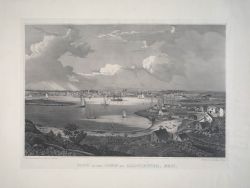
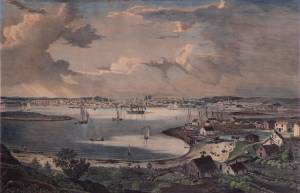
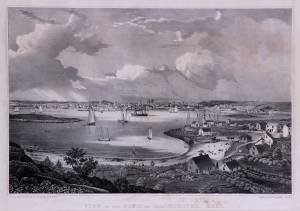
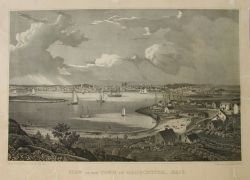
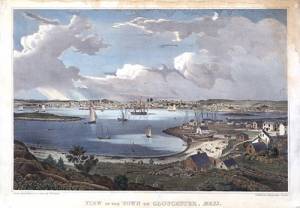
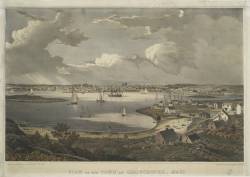
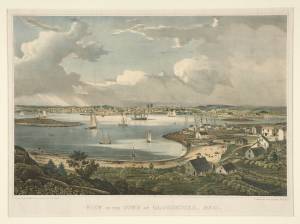
Commentary
As indicated to the lower left of the image, Lane designed this image and drew it on the stone. It was then printed at Pendleton's Lithography.
Commentary and a Visual Guide
This work is Lane’s first lithographic view of Gloucester and has aspects not repeated in his two later views. Most noticeable is the high vantage point, offering a downward view of the foreground and raising the horizon to the image’s vertical midpoint. The result of the higher vantage point was a more intimate foreground view of East Gloucester, but a very distant view of Gloucester’s harbor community in the background. Since most of Lane’s potential customers for paintings were businessmen working and living in the latter, it must have made sense (perhaps at the suggestion of the publisher) for his second lithograph, View of Gloucester, (From Rocky Neck), 1846 (inv. 92), to focus more closely on Harbor Cove and its neighborhood.
The horizontal angle of view in this image is ninety-two degrees, the widest in the three Gloucester lithographs, whose angles diminish progressively. This narrowing brought sharper focus on vessels and harbor infrastructure, which was further magnified by a larger format in each succeeding view. Whatever its commercial faults, this charming picture offers many details of interest and importance in Gloucester Harbor that are absent in its succeeding views.
The foreground offers a rare view of the oldest part of the East Gloucester community (1), which was clustered adjacent to Smith’s Cove (2). The importance of fishing to this village is evident in the wharves, sheds, and flake yard (3) belonging to the Wonson family. The wharves were of the cob wharf type (4), which was typical for Gloucester in the first half of the nineteenth century. Grounded out alongside the cob wharf is a fishing schooner type called a pinky (5), the term referring to the “pink” (pinched) stern whose name and design has Dutch origins. (See key below.)
Anchored in Smith’s Cove is a New England boat of the double-ended type (6). These boats were descendants of colonial craft called shallops whose design and construction influenced many New England workboat types. This specific type became a motif for many of Lane’s later depictions of Gloucester Harbor.
The finger of land enclosing Smith’s Cove at left is Rocky Neck (7). True to its name, it offered hostile ground to early efforts at farming and gardening, hence there were few settlers. It did make itself useful to Lane when he chose it as his viewing point for two subsequent lithographs of Gloucester Harbor as well as a few paintings, including Gloucester Harbor from Rocky Neck, 1844 (inv. 14) and Three Master on the Gloucester Railways, 1857 (inv. 29).
Once unfit for anything but sheep pounds, Five Pound Island (8) outgrew this use to serve the fishing industry as a flake yard for drying salt cod. Three shacks were also built on it for stowage of fishing gear.
The schooner was the vessel of choice for fishing on distant grounds, and it is safe to say that most of the vessels rigged like the chosen example (9) were used for this work. One exception (10) is a topsail schooner, so named for the square sail she sets on the foremast. This vessel was in the coastal trade, going between coastal ports with cargoes of various trade goods, and often taking passengers to ports too distant or isolated to reach by stagecoach. Square topsails made longer passages more comfortable, steadying the vessel’s motion and making steering easier.
Vessels entering Gloucester often had to anchor in The Stream (11)—a wide channel at the entrance to the Inner Harbor—while waiting to unload cargo at a busy wharf or to wait for high tide in order to get to that wharf. The Stream was often used for “lightering”—partially unloading deeply loaded vessels so they could clear Harbor Cove’s bottom and reach a wharf for final unloading. The anchored ship (12) is a good example of a large vessel that had to deal with this situation.
The most important part of Gloucester’s Inner Harbor was Harbor Cove (13). Enclosed by Fort Point (14) on its west side and by Duncan’s Point (15) on its east side, it offered the deepest water for loading and unloading at the wharves. Even so, much of it was so shallow at low tide that vessels would be grounded out and have to wait for high tide to be moved. Strange to say, this problem was not solved by dredging until early in the twentieth century.
Another cove adjacent to Duncan’s Point was Vincent’s Cove (16), which was mostly bare ground at low tide. Its inner shoreline was suitable for shipbuilding, and large vessels could be launched at high tide. Little is known about this activity prior to the Civil War.
Prominent on the Gloucester skyline were its churches, which helped to guide vessels entering Gloucester Harbor to safe anchorage. Most prominent was the Universalist Church (17), whose tall steeple and lantern were the first to be seen on entering. The First Parish Congregational Church (18) had a very tall spire later in the century, but its domed belfry was still easily seen on reaching Ten Pound Island. The Unitarian Church (19) was distinguished by its tall, flat-roofed bell tower with four slender spires at the corners.
Beyond this skyline rose the rocky post-glacial terrain of Cape Ann, shorn of its precolonial woodlands and reduced to hardscrabble farming and early efforts to extract granite of high quality from quarries. The harshness of this landscape was the prime mover in turning Gloucester’s people to make their living from the sea.
– Erik Ronnberg
Viewpoint map showing Lane's location when creating the lithograph